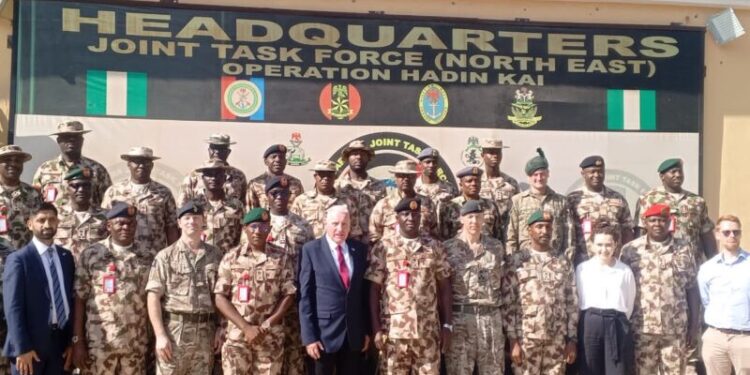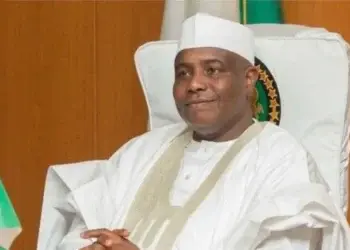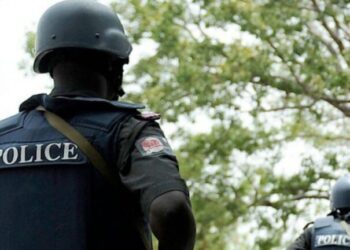Major General Shaibu Wahidi, the Theater Commander of Operation Hadin Kai, has praised the enduring partnership between Nigeria and the United Kingdom, which has developed over many years.
This statement was made during the visit of the Defence Adviser from the British High Commission in Abuja, alongside the Head of British Defence Staff for West Africa, to the North East Theater Command Headquarters in Maiduguri.
Maj. Gen. Wahidi underscored the significance of Lord Vernon Coaker’s presence, the UK Minister of State for Defence, affirming the strength of this bilateral relationship. He expressed his delight in hosting Lord Coaker and his team in Maiduguri, often referred to as the “Home of Peace” and the capital of Borno State.
He articulated, “The mandate of the Joint Task Force (North East) Operation Hadin Kai is to restore normalcy in the North East region, thereby enabling socio-economic activities to flourish. This mandate not only entails defeating insurgency in the area but also entails supporting civil authorities in re-establishing an environment conducive for citizens to resume their daily lives.”
“This mission provides an opportunity for internally displaced persons (IDPs) to return to their homes, rebuild their livelihoods, and foster economic growth both individually and as a community.”
He continued, “Achieving this mandate requires that our troops are well-equipped with essential resources, as well as the knowledge and training necessary to effectively address evolving security challenges. The Joint Task Force (North East) Operation Hadin Kai has prioritized the continuous training and retraining of its personnel through the Theatre Training School, which orchestrates training activities throughout the operational zone in the Northeast.”
Maj. Gen. Wahidi noted, “Military diplomacy is a crucial element of international relations that helps strengthen both bilateral and regional partnerships. Military training cooperation is an integral aspect of this diplomacy.”
He acknowledged the significant contributions made by the British Defence Staff for West Africa (BDS-WA) over the years, which have bolstered their counter-insurgency efforts and enhanced the training of troops in critical areas, particularly concerning Counter Improvised Explosive Device (CIED) operations.
“The BDS-WA has provided vital support in areas such as Counter IED training, Tactical Instruction for Trainers, the provision of CIED equipment, and the establishment of a Counter IED Coordination Cell. This cell serves as an information hub, allowing us to gather intelligence on the IEDs employed by insurgents, which is crucial for dismantling their networks and capabilities.”
Maj. Gen. Wahidi emphasized the importance of the Counter IED Coordination Cell, stating, “We find this hub invaluable, and we appreciate the mentorship provided by your team in establishing it fully. The various IED detection and clearance equipment, office supplies, tactical intelligence kits, laptops, and a 5 Kva generator have significantly enhanced our troops’ ability to effectively detect, neutralize, and disarm IEDs.”
He also highlighted the Instructor Development Programme being implemented in partnership with the BDS-WA, which brings together instructors from across the operational theatre and the Multinational Joint Task Force for an intensive six-week training course. This initiative aims to cultivate a cadre of instructors capable of organizing training sessions for their respective troops, fostering collaboration among forces from the Lake Chad Basin countries.
Maj. Gen. Wahidi affirmed that the contributions from BDS-WA have been made in consultation with his staff, ensuring that the support received is relevant, efficient, and timely.
He acknowledged the expertise provided by UK personnel as a significant asset to the Joint Task Force’s ongoing efforts to enhance their operational responses and reduce casualties among both troops and civilians while making strides against insurgents.
“On behalf of the Chief of Defence Staff, General CG Musa, OFR, and the Chief of Army Staff, Lieutenant General OO Oluyede – NAM, we extend our gratitude to the UK Government for the donation of C-IED equipment to the Theatre. I would like to express particular appreciation to the BDS-WA for their collaborative support in helping us fulfill our mandate. Once again, I welcome you and your delegation to Maiduguri,” concluded Wahidi.











